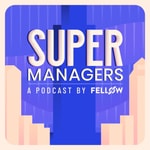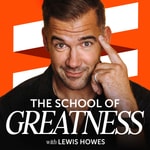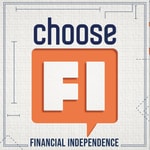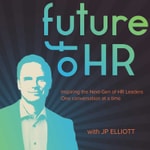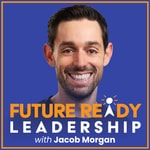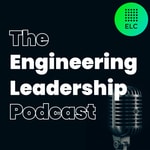AI and the Future of Work: Artificial Intelligence in the Workplace, Business, Ethics, HR, and IT for AI Enthusiasts, Leaders and Academics – Détails, épisodes et analyse
Détails du podcast
Informations techniques et générales issues du flux RSS du podcast.
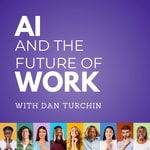
AI and the Future of Work: Artificial Intelligence in the Workplace, Business, Ethics, HR, and IT for AI Enthusiasts, Leaders and Academics
Dan Turchin
Fréquence : 1 épisode/7j. Total Éps: 288

Host Dan Turchin, PeopleReign CEO, explores how AI is changing the workplace. He interviews thought leaders and technologists from industry and academia who share their experiences and insights about artificial intelligence and what it means to be human in the era of AI-driven automation. Learn more about PeopleReign, the system of intelligence for IT and HR employee service: http://www.peoplereign.io.
Classements récents
Dernières positions dans les classements Apple Podcasts et Spotify.
Apple Podcasts
🇨🇦 Canada - technology
03/07/2025#99🇨🇦 Canada - technology
30/06/2025#88🇨🇦 Canada - technology
03/06/2025#95🇨🇦 Canada - technology
18/05/2025#85🇨🇦 Canada - technology
07/05/2025#80🇬🇧 Grande Bretagne - technology
10/04/2025#80🇬🇧 Grande Bretagne - technology
01/04/2025#91🇬🇧 Grande Bretagne - technology
31/03/2025#84🇨🇦 Canada - technology
08/03/2025#88🇨🇦 Canada - technology
04/03/2025#63
Spotify
Aucun classement récent disponible
Liens partagés entre épisodes et podcasts
Liens présents dans les descriptions d'épisodes et autres podcasts les utilisant également.
See all- https://asana.com/
497 partages
- https://www.notion.so/
475 partages
- https://www.shopify.com/
435 partages
- https://www.linkedin.com/in/reidhoffman/
39 partages
- https://www.linkedin.com/in/vosspeter/
33 partages
- https://www.linkedin.com/in/joshdrean/
30 partages
Qualité et score du flux RSS
Évaluation technique de la qualité et de la structure du flux RSS.
See allScore global : 48%
Historique des publications
Répartition mensuelle des publications d'épisodes au fil des années.
300: Pankaj Kedia, AI pioneer and VC @ 2468 Ventures, On The Fast Approaching Age of Abundance
Saison 5 · Épisode 300
lundi 2 septembre 2024 • Durée 31:38
Pankaj Kedia has been a trailblazer across laptop PC, smartphone, and wearable products, having held leadership roles at Intel and Qualcomm over the last 3 decades. Now an active AI investor, advisor, mentor, and speaker, Pankaj founded 2468 Ventures in 2021 and has since made angel investments in such notable AI companies as Anthropic, Athena, Figure, Groq, and OpenAI. Recently appointed as the Chief AI Officer and board member at Biossmann, a Mexican healthcare solutions company, Pankaj brings a wealth of experience and expertise to the AI space. He holds engineering degrees from IIT Roorkee and the University of Michigan, along with an MBA from Wharton.
In this conversation, we discuss:
- The journey of transitioning from early AI work in the 1980s to becoming a key player in the wearable revolution.
- Leadership lessons learned from working with iconic leaders like Andy Grove at Intel and Irwin Jacobs at Qualcomm.
- The evolution of wearable technology and its role in augmenting human capabilities through AI.
- The ethical implications and potential risks associated with the integration of AI in wearable devices.
- Insights into the mindset and qualities of successful AI entrepreneurs and the criteria for investing in disruptive technologies.
- Predictions about the future of work, the rise of AGI, and the shift towards an age of abundance where work becomes a choice rather than a necessity.
Resources
Subscribe to the AI & The Future of Work Newsletter
AI fun fact article
Babak Hodjat, co-inventor of Siri, on AI and the Future of Work
299: Josh Allan Dykstra, Founder of The Work Revolution, On Finding Work You'll Love
Saison 5
lundi 26 août 2024 • Durée 32:56
Josh Allan Dykstra is a polymath and TEDx speaker who has made significant contributions as a published author, musician, and CEO. As a sought-after coach on the future of work, Josh has collaborated with industry giants like Amazon, Microsoft, Apple, and Chanel. He founded The Work Revolution, an organization dedicated to creating energy-based workplaces where teams can thrive, believing that work life can be a source of positivity. Josh is also the author of "Igniting the Invisible Tribe," and his boundless energy and innovative approach have inspired many to rethink their work and lives.
In this conversation, we discuss:
- Josh's journey from a classically trained musician to becoming a leading voice in the future of work.
- We explore the pivotal moment that led Josh to shift his focus from music to transforming the workplace.
- Josh shares his vision for an energy-based work system that empowers employees rather than draining them.
- The concept of a work revolution and what it means to completely turn around traditional work systems.
- Josh’s belief that work can be a force for healing the world, even amid global challenges.
- The potential of AI in the workplace and how leaders can prepare for the future while prioritizing human well-being.
Resources
290: Adityo Prakash, Founder & CEO of Verseon, On Extending Life With AI
lundi 24 juin 2024 • Durée 29:50
Adityo Prakash is a serial entrepreneur, high-tech CEO, amateur photographer, and author who transitioned from academia to revolutionize video streaming, and is now transforming drug discovery and commercialization. As the founder of Verseon, Adityo employs deep quantum modeling and AI to expedite the identification and development of innovative pharmaceuticals, potentially reshaping our approach to aging and healthcare. With degrees in math and physics from Caltech and over 40 patents to his name, Adityo is at the forefront of technological advancements in the medical field.
In this conversation, we discuss:
- How Verseon uses deep quantum modeling and AI to revolutionize drug discovery and development, aiming to change the standard of care for various diseases.
- Adityo's journey from Caltech, where he studied math and physics, to founding Verseon and securing over 40 patents.
- The challenges and opportunities at the intersection of high tech and biotech, and how these fields are converging to create new platform companies.
- The limitations of traditional trial-and-error drug discovery methods and how Verseon's approach offers a more systematic, atom-by-atom design of new drugs.
- The potential for AI and advanced modeling techniques to address complex health issues like aging, by treating it as a disease with identifiable therapeutic targets.
- The future of drug development, regulatory challenges, and how the integration of AI and physics could transform the pharmaceutical industry over the next decade.
Resources
An episode you might like about which AI businesses are getting investor dollars
Rana Gujral, CEO of Behavioral Signals, discusses the future of NLP and sentiment analysis to improve customer service
Saison 3 · Épisode 39
dimanche 9 octobre 2022 • Durée 41:43
Rana Gujral, CEO of Behavioral Signals since 2018, joined the company after a distinguished tech career growing companies like Logitech, TiZE, and Cricut. Behavioral Signals uses emotion and behavioral science to help contact center agents deliver better service. Rana and the team are on a mission to improve customer interactions by using signals other than the spoken word to understand exactly what they need based on indicators like voice tone and pitch.
Listen and learn...
- How to train AI models on past service interactions and outcomes to determine which agents should speak to which customers
- How to use deep learning and NLP to process non-speech behavior signals like intonation, pitch, and tonal variance
- How behavior signals can be used to predict stress, duress, and propensity to buy or pay
- How to achieve high levels of prediction accuracy without processing "the spoken word"
- Why tone and pitch are better indicators of sentiment than actual words across any language
- How to compete with Google/Microsoft/Amazon for data when building an AI-first conversational intelligence product
- The biggest opportunity Rana sees to use AI to help humans live better lives
References in this episode:
- Mahesh Ram from Solvvy (now Zoom) on AI and the Future of Work
- Gadi Shamia from Replicant on AI and the Future of Work
- How personalization algorithms work in your social feeds
- Behavioral Signals
Ahmed Elsamadisi, Narrator CEO, is a roboticist by training and one of the first engineers at WeWork. Now he's changing how the world tells stories with data.
Saison 3 · Épisode 38
dimanche 2 octobre 2022 • Durée 52:08
Ahmed Elsamadisi built the data infrastructure at WeWork before realizing every company could benefit from his team’s innovation. Traditional star schemas aren’t the best way to manage data. Ahmed instead pioneered a new approach using a single-table column model better suited for real questions people ask. He launched Narrator in 2017 to make it easier to turn data questions into answers and has since raised $6.2M from Initialized Capital, Flybridge Capital Partners, and Y Combinator. Ahmed received his BS in Robotics from Cornell. Hear from a pioneer (and tech provocateur) how new data wrangling techniques are making it easier for mere mortals to get more value out of their data.
Listen and learn…
- How a roboticist who got his start building self-driving cars and designing missile defense systems ended up redefining how data is stored
- Why traditional approaches that require SQL to access data are broken
- How a single-column schema eliminates the complexity of joining systems and tables
- Why it’s easier to tell better stories with data using temporal relationships extracted from customer journeys
- Why Snowflake, Redshift, and BigQuery are really all the same… and data modeling is the place to innovate
- What it means to replace traditional tables with activities… and why they’ll eliminate the need for specialized data analysts
- How to reduce data storage costs by 90% and time to generate data insights from weeks to minutes
- Why data management vendors are responsible for bad decisions made using your data
- What is data cleaning and how you should do it
- What is a racist algorithm
- Why querying data with natural language will never work
- Is the WeCrashed version of Adam Neumann’s neuroticism accurate? Hear from someone who lived it...
References in this episode:
- Google’s LaMDA isn’t sentient
- Chandra Khatri from Got It AI on AI and the Future of Work
- Derek Steer from Mode on AI and the Future of Work
- Barr Moses from Monte Carlo on AI and the Future of Work
- Peter Fishman from Mozart Data on AI and the Future of Work
- Ahmed on Twitter
Seth Earley, author of The AI-Powered Enterprise, discusses the future of knowledge management
Saison 3 · Épisode 37
dimanche 25 septembre 2022 • Durée 42:55
Seth Earley is a Chemist by training and an expert on AI. Specifically, how AI is used to improve knowledge management. In fact, he wrote the book on the topic titled “The AI-Powered Enterprise” in which he explains the importance of ontologies when applying AI. Seth is the CEO of Earley Information Science. He has been advising companies on technology strategy since 1994 and is currently focused on AI and knowledge engineering.
Listen and learn:
- Seth’s contribution to AI history… including the term he coined that was co-opted by former IBM CEO Ginni Rometty
- Why all AI is a data (and information architecture) problem
- How the Applied Materials field services team reduced time spent finding information by 50% with knowledge engineering and ontologies
- Why proper information architecture is required for virtual agents to reduce call volume and help live agents
- What has changed since Seth first published his AI book in 2020
- The benefits of semantic search vs. traditional keyword search
- Where to start with a knowledge management strategy
- Why “data scientists spend more time being data janitors”
- How to mitigate the impact of bias in AI training data
References in this episode:
- How AI can detect employee burnout
- The Innovation Delusion on Amazon
- Earley Information Science
- The AI-Powered Enterprise on Amazon
- Kevin Dewalt, Prolego CEO, on AI and the Future of Work
Peter Scott, popular author, TedX speaker, and futurist, discusses how to ensure AI is used for good… despite the potential for it doing harm
Saison 3 · Épisode 36
dimanche 18 septembre 2022 • Durée 32:49
Peter Scott, author, TedX speaker, and futurist, worked at NASA’s JPL laboratory after receiving his Masters Degree in Computer Science from Cambridge. Raising kids made him realize the potential impact of AI to do both good and harm. He left NASA and switched careers to feel confident he was doing all he could to secure their future. He recently published Artificial Intelligence and You after publishing Crisis of Control five years back.
Listen and learn:
- When will we achieve artificial general intelligence (AGI)… and is that the right goal for the AI community?
- Why we weight the potential of AI doing harm about five times as much as the potential for it doing good.
- What’s the biggest global problem AI might solve in the near term.
- How DeepMind’s AlphaFold protein folding technology could change humanity.
- What does it mean to be human in an era when machines can do more tasks historically reserved for humans?
- Why Peter blames Big Tech for “breaking” democracy.
- What Peter expects will be AI’s greatest achievement in the next decade.
- Why the evolution of a digital race hinges on global economic incentives.
References in this episode:
Kia Kokalitcheva, Axios tech reporter and co-author of the Pro Rata newsletter, discusses what Adam Neumann’s new company Flow means for the future of work
Saison 3 · Épisode 35
dimanche 11 septembre 2022 • Durée 31:33
Kia Kokalitcheva, Axios tech reporter, is a Silicon Valley native who writes about tech news and culture. Among other things, she co-authors the popular Pro Rata newsletter (over 200k subscribers) with Dan Primack. Kia has covered many of the most iconic tech stories of the past decade as a writer at Fortune and VentureBeat prior to Axios which was just acquired by Cox Enterprises. Kia recently wrote about Adam Neumann’s new company, Flow. Hear Kia’s perspectives on how Flow could transform living like WeWork transformed working… and why she’s not scared that bots may take her job.
Listen and learn…
- How Adam Neumann of WeWork fame raised $350M at a $1B valuation from A16Z for his new company Flow… before launching
- Kia’s proudest moment as a journalist
- What the acquisition of Axios by Cox Enterprises means for journalism
- How Flow may be more than the reincarnation of WeWork’s failed WeLive experiment
- As a culture, are we ready for communal living?
- What is the future of company perks… are the days of on-site dry cleaning numbered?
- How the generational shift is impacting cultural norms in the workplace
- What tasks bots will never do better than live journalists
References in this episode:
- How AI is transforming journalism according to The Knight Foundation
- Gary A. Bolles discusses the WorkNet on AI and the Future of Work
- Mark van Rijmenam, The Digital Speaker, on AI and the Future of Work
Deon Nicholas, CEO of Forethought, discusses how human-centered AI improves the customer experience
Saison 3 · Épisode 34
dimanche 4 septembre 2022 • Durée 35:07
Deon Nicholas, Forethought Co-Founder CEO, grew up in inner city Toronto stocking shelves in a pharmacy before learning to code at an early age. He started Forethought in 2017 after learning the value of answering customer questions working for companies like Facebook and Pure Storage.
Deon has since raised $92M from an exceptional group of investors including funds like Steadfast Capital and NEA plus celebrities including Gwyneth Paltrow, Ashton Kutcher, and Robert Downey Jr. Deon won the TechCrunch Disrupt Battlefield startup competition in 2018 and is a member of the Forbes 30 under 30. He’s also a mentor and advisor to founders of color.
Listen and learn...
- How AI connects customers to the right agents then indicates the likelihood of a support interaction escalating
- How to use historical data to help live agents fix problems faster
- The evolution of chatbots from decision trees to AI
- How to combine generic language models with domain-specific data to increase the accuracy of NLP
- How to solve the problem of bias encoded in data
- How GANs, generative adversarial networks, work
- Why ML pipelines need to be monitored like web apps
References in this episode...
Jim Lawton, worldwide authority on industrial robots, discusses how humans and machines are partnering to improve safety and efficiency in manufacturing
Saison 3 · Épisode 33
dimanche 28 août 2022 • Durée 41:56
Jim Lawton, VP and GM of Robotics Automation at Zebra Technologies, met the founder of Roomba, Rodney Brooks, at MIT nearly three decades ago. It inspired a lifetime passion for robots that help humans. Since then, he has influenced generations of robotic automation technology at companies from Rethink Robotics to Zebra Technologies. This is a fascinating discussion that will make you reconsider what robots can do and why humans shouldn't feel threatened by them.
Listen and learn...
- How Jim cultivated a passion for robots... and why that makes him "the cool dad"
- How innovation in robotic technology is helping AMRs, autonomous mobile robots, perform more human-like tasks with less training
- Which "dirty, dull, dangerous" tasks are the best candidates for robotic automation
- How new training techniques are reducing the time required to train a robot from 300 hours to a fraction of that which "democratizes automation"
- What's required to keep humans safe from robots
- How supplementing humans with robots for a task like picking items from warehouse shelves using machine vision saves 12-15 miles of walking per day while increasing accuracy
- How techniques like SLAM and machine learning are making it easier to program robots to do more complex tasks more accurately with zero or minimal coding
- Which new careers will be created by industrial robots... and which will be eliminated
- Two quick ways to know if a factory using robots and humans is safe
- Why Jim's passion is using robots to help people be their best selves
References in this episode:


